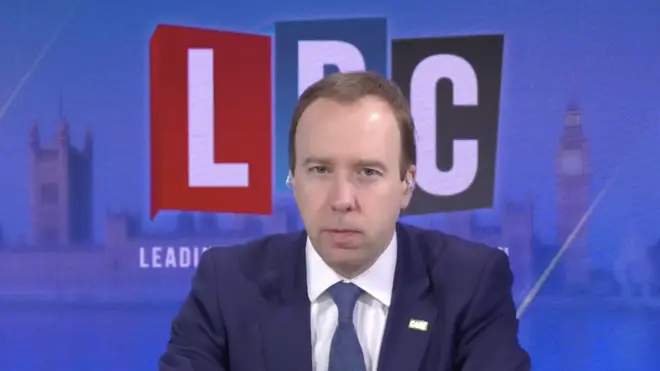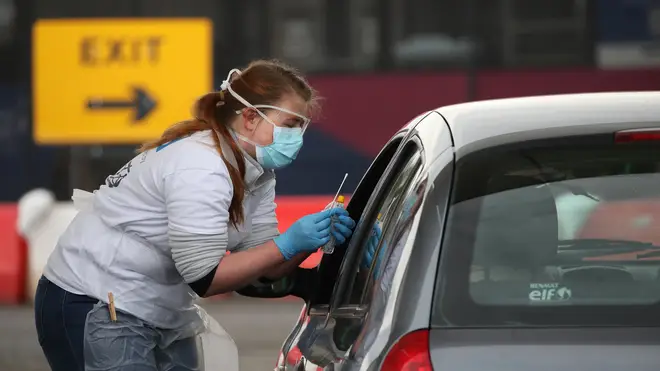
Tom Swarbrick 4pm - 7pm
3 September 2020, 00:01 | Updated: 3 September 2020, 11:05

Matt Hancock says fast Covid-19 tests will help people go back to work
Quick tests for Covid-19 will give people 'confidence' to go back to normal, Matt Hancock has said, as the government announces it will spend £500 million on trials for a 20-minute test.
Speaking to LBC's Nick Ferrari, the Health Secretary said that although Britain has one of the biggest testing regimes on the planet, he wants it to go further to help life get back to normal.
“Over the past few months we’ve massively expanded the coronavirus testing as a country, and now have one of the biggest testing programmes in the world," he told Nick.
“But I am not satisfied with that.
“We know that other than social distancing, testing is one of our primary defences against the virus, to find the people that are positive and for them and their contacts to isolate so that we can stop the spread of the virus.
“At the moment that is working and that is effective. But the tests have to go off to a lab, it normally takes 24 hours for them to come back.


“There are new technologies that are coming down the track so we can not only much more easily test people that might have symptoms but also role it out much more broadly, mass testing, to give people the confidence that if they test negative they can go about their normal business.”
Mr Hancock said the funding package would also help efforts to explore the benefits of repeatedly testing people for Covid-19.
The money will go towards the launch of a new community-wide repeat population testing trial in Salford, Greater Manchester.
There will also be an expansion of the existing trials in Southampton and Hampshire that use a no-swab saliva test and a rapid 20-minute test.
Speaking about the new half-a-billion funding package, Mr Hancock said: "Testing is a vital line of defence in combating this pandemic.
Read more: Cheap steroids cut risk of death in critically ill coronavirus patients
Read more: Former Italian PM Silvio Berlusconi tests positive for Covid-19

Johnson: The Government wants to get people back to work
"Over the past six months, we have built almost from scratch one of the biggest testing systems in the world.
"We need to use every new innovation at our disposal to expand the use of testing, and build the mass testing capability that can help suppress the virus and enable more of the things that make life worth living.
"We are backing innovative new tests that are fast, accurate and easier to use and will maximise the impact and scale of testing, helping us to get back to a more normal way of life."
Saliva-based testing will be used for the pilot in Salford, which will involve the city council and other local partners, the Department of Health and Social Care (DHSC) said.
It will perform up to 250 tests a day on a select number of residents who will be invited for weekly tests and will initially focus on places with high footfall, such as retail areas, public services, transport and faith spaces.
The trial's aim is to identify positive Covid-19 infections early, including for those with minor symptoms or who are asymptomatic, so people can quarantine themselves.
Watch: Caller who lost his mum to Covid describes his pain five months on
Watch: "Tory MPs are pushing for lockdown lift against advice," claims Labour MP

"Tory MPs are pushing for lockdown lifts against advice," claims Labour MP
Results will inform how regular repeat community testing could be scaled up across the country.
In Southampton, the second phase of a no-swab saliva test pilot is due to begin this week, which will see a weekly testing model trialled with more than 2,100 pupils and staff across four schools.
The work is led by a partnership of the University of Southampton, Southampton City Council and the NHS.
Meanwhile, in Hampshire, the pilot of a rapid 20-minute coronavirus test will be expanded "to further explore the applications of mobile testing in different settings", the DHSC said.
Funding will also be used to extend capacity for existing polymerase chain reaction (PCR) testing currently being used in the UK.
Baroness Dido Harding, interim executive chairwoman of the National Institute for Health Protection, the body replacing Public Health England, said: "New testing technologies and methods are vital to keep the system evolving and improving, especially as we assess how routine testing could help pick up cases of the virus earlier.
"We will continue to scale up our testing capacity by expanding our network of testing sites and investing in new technologies to reach even more people through NHS Test and Trace."
Listen & subscribe: Global Player | Apple Podcasts | Google Podcasts | Spotify